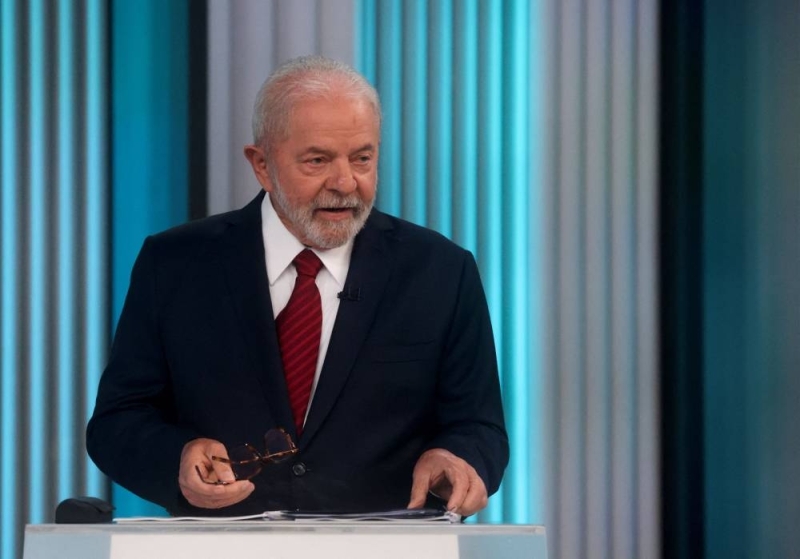Sat, October 29, 2022

Leftist challenger Luiz Inacio Lula da Silva's lead over far-right incumbent Jair Bolsonaro narrowed slightly on the eve of Brazil's polarizing presidential runoff, according to a poll published late Saturday.
Lula has 52 percent voter support to 48 percent for Bolsonaro, according to the poll from the Datafolha institute -- down from a six-point gap (53 percent to 47 percent) on Thursday.
The figures exclude voters who plan to cast blank or spoiled ballots -- four percent of respondents, Datafolha estimates. Undecided voters represented just two percent.
The margin of error for the poll, which was based on interviews with 8,308 people on Friday and Saturday, was plus or minus two percentage points.
According to Datafolha, only half of those polled watched an insult-filled final debate between the rivals on Friday night, 19 percent of them until the end.
The poll indicated that 37 percent thought Lula had come out on top during the debate, while 29 percent thought Bolsonaro had performed best.
Lula, the charismatic but tarnished ex-president who led Brazil from 2003 to 2010, won the first round of the election on October 2 with 48 percent of the vote, to 43 percent for former army captain Bolsonaro.
Bolsonaro and his allies have attacked polling firms, accusing them of bias.
He outperformed pollsters' expectations in the first round, triumphantly boasting afterward: "We beat the lie."
Lula, 77, leads among women (51 percent), the poor and working-class (57 percent), and Catholics (56 percent), according to Datafolha.
Bolsonaro, 67, leads among evangelical Christians (65 percent) and wealthier voters (52 percent).
fb/mdl
Bolsonaro, Lula trade blows in bruising final Brazil election debate

Former Brazil's President and presidential candidate Luiz Inacio Lula da Silva attends a Presidential Debate ahead of the national election, in Rio de Janeiro, Brazil October 28, 2022. ― Reuters pic
Saturday, 29 Oct 2022
RIO DE JANEIRO, Oct 29 ― Brazil's right-wing President Jair Bolsonaro and his leftist election rival, Luiz Inacio Lula da Silva, traded barbs late yesterday in their final televised debate ahead of tomorrow's tense runoff vote.
Polls suggest Lula is the slight favourite to come back for a third term, capping a remarkable political renaissance after his jailing on graft convictions that were overturned. But Bolsonaro outperformed opinion polls in the first-round vote this month, and many analysts say the election could go either way.
During yesterday's free-wheeling debate, the deeply polarising figures attacked each other's character and record, accused each other of lying and refused repeatedly to answer each other's questions.
Bolsonaro opened the debate by denying reports that he might unpeg the minimum wage from inflation, announcing instead he would raise it to 1,400 reais (RM1,227) a month if re-elected, a move that is not in his government's 2023 budget.
Still, most analysts and focus groups with undecided voters suggested the president had done little to shake up a race that polls show broadly stable since Lula led the first round of voting on October 2 by 5 percentage points.
That result was better for Bolsonaro than most polls had shown, giving him a boost of momentum to start the month, but the past two weeks of the campaign have presented headwinds.
On Sunday, one of Bolsonaro's allies opened fire on Federal Police officers coming to arrest him. A week earlier Bolsonaro had to defend himself from attack ads after he told an anecdote about meeting Venezuelan migrant girls in suggestive terms.
In their first head-to-head debate this month, Lula blasted Bolsonaro's handling of a pandemic in which nearly 700,000 Brazilians have died, while Bolsonaro focused on the graft scandals that tarnished the reputation of Lula's Workers Party.
Last night, both candidates returned repeatedly to Lula's two terms as president from 2003 to 2010, when high commodity prices helped to boost the economy and combat poverty. Lula vowed to revive those boom times, while Bolsonaro suggested current social programs are more effective. ― Reuters
No comments:
Post a Comment